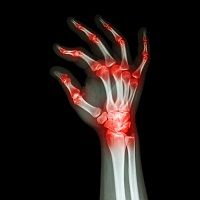Article
Genetic Variants Predict Rheumatoid Arthritis Severity
Author(s):
Joint pain, swelling, and stiffness are all common symptoms of rheumatoid arthritis (RA), however, researchers have identified genetic markers that can predict the severity of the disease.

Joint pain, swelling, and stiffness are all common symptoms of rheumatoid arthritis (RA), however, researchers have identified genetic markers that can predict the severity of the disease.
The British study led by Sebastien Viatte, MD, PhD, of the Arthritis Research UK Centre for Genetics and Genomics, showed that certain genetic variants are associated with the progression of RA. The University of Manchester researchers gathered data from 3 independent multi-center prospective cohort studies.
“To treat patients with rheumatoid arthritis more effectively and to prevent them being given drugs which won’t work for them, it’s important to know who is most likely to respond best to which drug, when and at what dose,” Stephen Simpson, director of research at Arthritis Research UK, saidin a news release.
Published in The Journal of the American Medical Association (JAMA), the team evaluated the 4,000 RA patients included in the prospective cohort studies. Hand and feet erosions revealed several genetic indicators for higher or lower risks of severity. The strongest of the newly found genetic determinants is the amino acid valine at position 11 of the HLA-DRB1 gene. In addition, positions 71 and 74 proved to be independent predictors of radiological damage. However, when the 3 positions are viewed together they are strong with predicting outcomes of RA.
“By year 5, the percentages of patients with erosions of the hands and feet were 48% of noncarriers (150/314) of valine at position 11, 61% of heterozygote carriers (130/213), and 74% of homozygote carriers (43/58),” the study explained.“Valine at position 11 also was associated with higher all-cause mortality in patients with inflammatory polyarthritis.”
Another discovery by team showed that HLA-DRB1 haplotypes are not only useful for forecasting severity outcomes, but for finding treatment responses as well.
"This major advance in genetics might allow stratification of rheumatoid arthritis patients at the onset of their disease to identify those at risk of joint damage and early death, and also those who are more likely to respond to anti-TNF biological therapy,” Viatte said.
This study confirms what many investigators have suspected for quite some time — genetics give insight into the progression of RA. Physicians may soon better prepare patients for the onset of the disease and prescribe the best form of treatment for their individualized situation.
“This new research takes us a step closer to that goal,” Simpson said.





